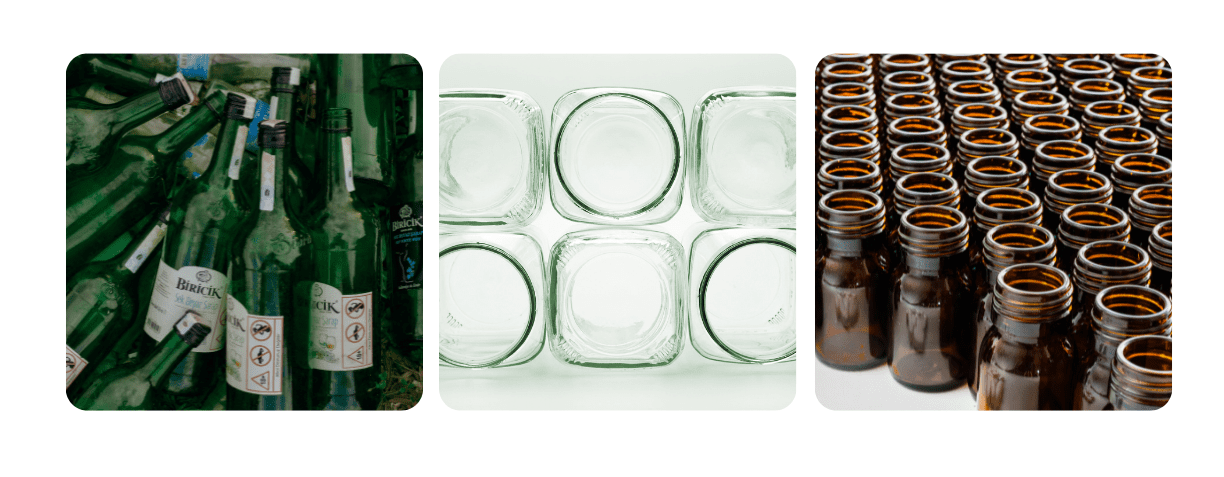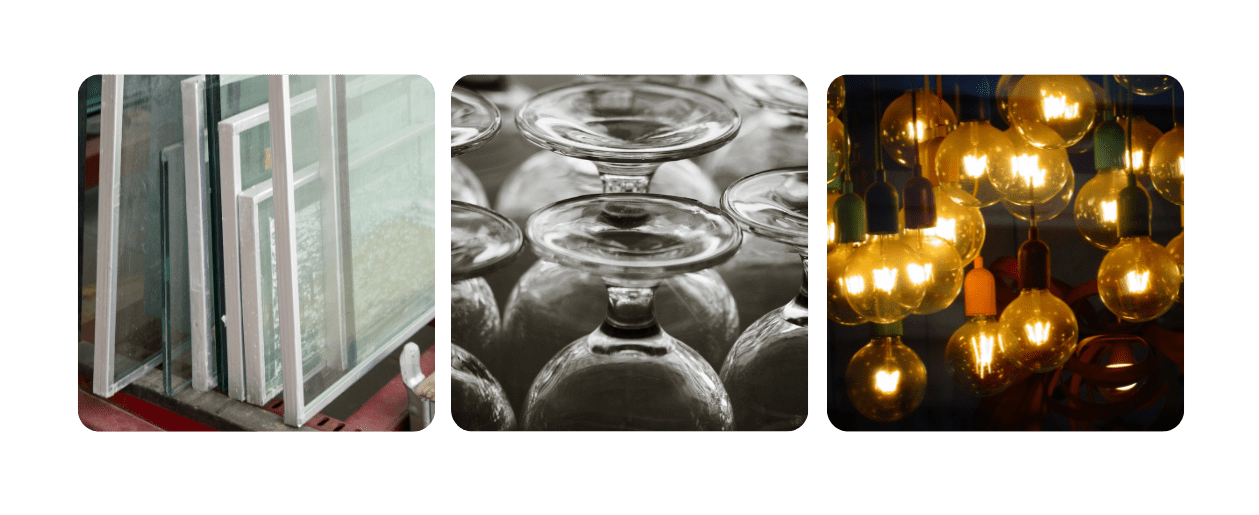
What glass can you recycle?
More people than ever are recycling and we couldn’t be happier – as the glass industry, we love to be able to use recycled glass when we manufacture new containers. However, not all varieties can be used in production.
So, in this post, we will explain why not all glass is recyclable and what types of glass you can and cannot recycle. That way, the next time you need to dispose of your containers, you’ll know exactly what to do.
Why should you recycle glass?
There are many benefits to recycling glass, some of which you might not know yet. For example, did you know that recycling glass saves over 12 million tonnes of raw materials each year?
Glass is a 100% recyclable material made from three natural ingredients – sand, soda ash and limestone. Making new containers from recycled glass not only saves on these raw materials, but also helps reduce energy consumption and CO2 emissions. And the best part? No matter how many times you recycle it, glass never loses its quality.
Recycling glass is a topical issue in modern societies all over the world, but it’s nothing new: glass packaging and its recycling has been an integral component of human lifestyles for millennia. Historical and archaeological evidence demonstrates that even in antiquity, glassworkers were already collecting and reprocessing broken glass into new consumer goods. Looking to the modern era, the current collection schemes in Europe have been in place for over fifty years, and today, some 1.5 million bottle banks are available for residents to rely on.
Is all glass recyclable?
In short, no. Despite its endless qualities, not all glass varieties can be collected in your household recycling.
There are diverse types of glass, with many different treatments applied to them. Your local lity’s rules for what you can and can’t put into household recycling might seem fussy on first glance – but while bottles might look all the same, they can have significant differences and create problems if unsuitable glass is mixed with packaging for re-melt. And the difficulty is that, like us, most equipment that sorts these materials at recycling centres can struggle to tell the difference.
Why can’t all glass be recycled?
Once you recycle your glass containers, they go through a long process. After being collected, glass is sent to recycling facilities where it is first crushed and then re-melted into what is known as cullet
There are two types of cullet: internal and external. Internal cullet comes from defective products right off the assembly line that failed quality control tests. External cullet is the waste glass that has been collected to be recycled. Generally, when we use the word cullet, we mean the external types of glass we can recycle.
But to recycle glass, it has to be purified and cleaned of contamination. It is then re-melted in large furnaces. Any small contaminant, such as the heat-resistant treatment found in Pyrex items, can impact the process due to different melting temperatures and potentially ruin a whole batch of freshly recycled glass.
That is also why, depending on your local community, you might be asked to separate the colours of the glass. Typically, glass products are clear, green or amber. substances and minerals are added in the initial production. So, when they are recycled, they need to be kept to the same colours to avoid contamination.
Knowing the answer to the question “what glass can you recycle?” It might seem confusing at first, but these handy tips will help you figure out which types of glass you can and cannot recycle.
Types of glass you can recycle
Although it depends on where you live and what the local recycling policy is, most glass items in your day-to-day life are 100% recyclable. Here’s a list of the most common collection types:
◾ Bottles of any colour (soft drinks, juices, water, wine, beer, spirits, food sauces and olive oil)
◾ Jars of any colour (food, jam, sauces, condiments, baby food, etc.)
◾ Cosmetics and perfume containers – also known as flacons
◾ Pharmaceutical packaging or vials
To properly dispose of your containers, separate the lids and corks from the jars and rinse them before placing them in the recycling bin. You can also check out our previous article for more tips on how to raise your recycling game.
![]()
Types of glass you cannot recycle
Sadly, not all items can be recycled with your everyday jars and bottles. Don’t be a ‘wishcycler!’ It’s important to avoid ‘’, where we toss non-recyclable items into the recycling bin in the hope that they will somehow be recycled anyway – they won’t be recycled, and they may even damage the equipment or contaminate the whole batch. The following are examples of common glass items you cannot recycle:
Glass cookware (eg heatproof jugs, Pyrex dishes, and microwave turntables)
These are made from borosilicate – a special type of glass that withstands temperature changes. But it won’t melt properly in most ordinary furnaces and can cause serious problems in the production.
Light bulbs
These are made of a heatproof glass, are often coated with special substances and may contain metallic components. All of this can cause problems if they’re re-melted with other types of glass.
Window glass
Glazing is often laminated or has been treated to make it tougher – and so it needs to be processed separately from other glass types if it’s re-melted. Panes of window glass can often be recycled via separate collections at local recycling sites.
Drinking glasses and Vases
Some of these have a different composition to ordinary bottles and jars. They may even be made of lead crystal. These glass types will cause problems and wastage in new glass if they get mixed into household recycling.
Nail varnish bottles
These are not normally accepted with bottles and jars. While the glass might be the right type, nail varnish contains chemicals which might not be compatible with the recycling equipment in your area. In some cases, if you clean it out thoroughly using nail polish remover, you can recycle the glass part of the bottle (not the lid/brush) – if in doubt, check with your local recycling facilities or municipality
Mirrors
The metallic coating on mirrors will cause contamination if it’s mixed with other glass types. However, many recycling sites do have a specific collection point for mirrors so that they can be properly processed separately.
Spectacles
Don’t put old sunglasses or spectacles in with your bottles and jars for recycling. They’re not the same type of glass and have hard–to–remove metal components.
Crystal Glass
Crystal is usually shinier than glass and is made from different minerals (such as lead-oxide, potassium carbonate, and silica), and therefore cannot be recycled together with jars and bottles.
![]()
How to dispose of the glass that can’t be recycled?
Now that you know what glass you can and cannot recycle, you may be wondering: what do you do with all the things that you can’t easily recycle?
Well, the first step is to ask your local community for guidelines. They might have specific rules for you to follow concerning the types of glass you can’t recycle. Once you’ve done that, there are a few more things you can do with your glass products.
Tying in with a sustainable lifestyle, you could try reusing your containers for other purposes, such as storage or decoration. Check out this article for ideas on how to reuse glass around home! If they’re not broken, you can also donate glass items such as cookware, mirrors and drinking glasses to charity shops, family and friends. You could even turn your unwanted glass into windowsill herbs or homemade decorations, and give your home a green-inspired makeover! Window glass can be reclaimed and reused by businesses such as construction and salvage companies, as well as charities.
There are plenty of ways to dispose of those hard-to-recycle glass products. Avoid being a wishcycler! Knowing what glass you can recycle will allow you to take that extra step towards protecting our planet. So next time you’re thinking of clearing out the stemware cupboard or getting rid of a mirror, remember these little tips and tricks to keep our planet happy and healthy!














